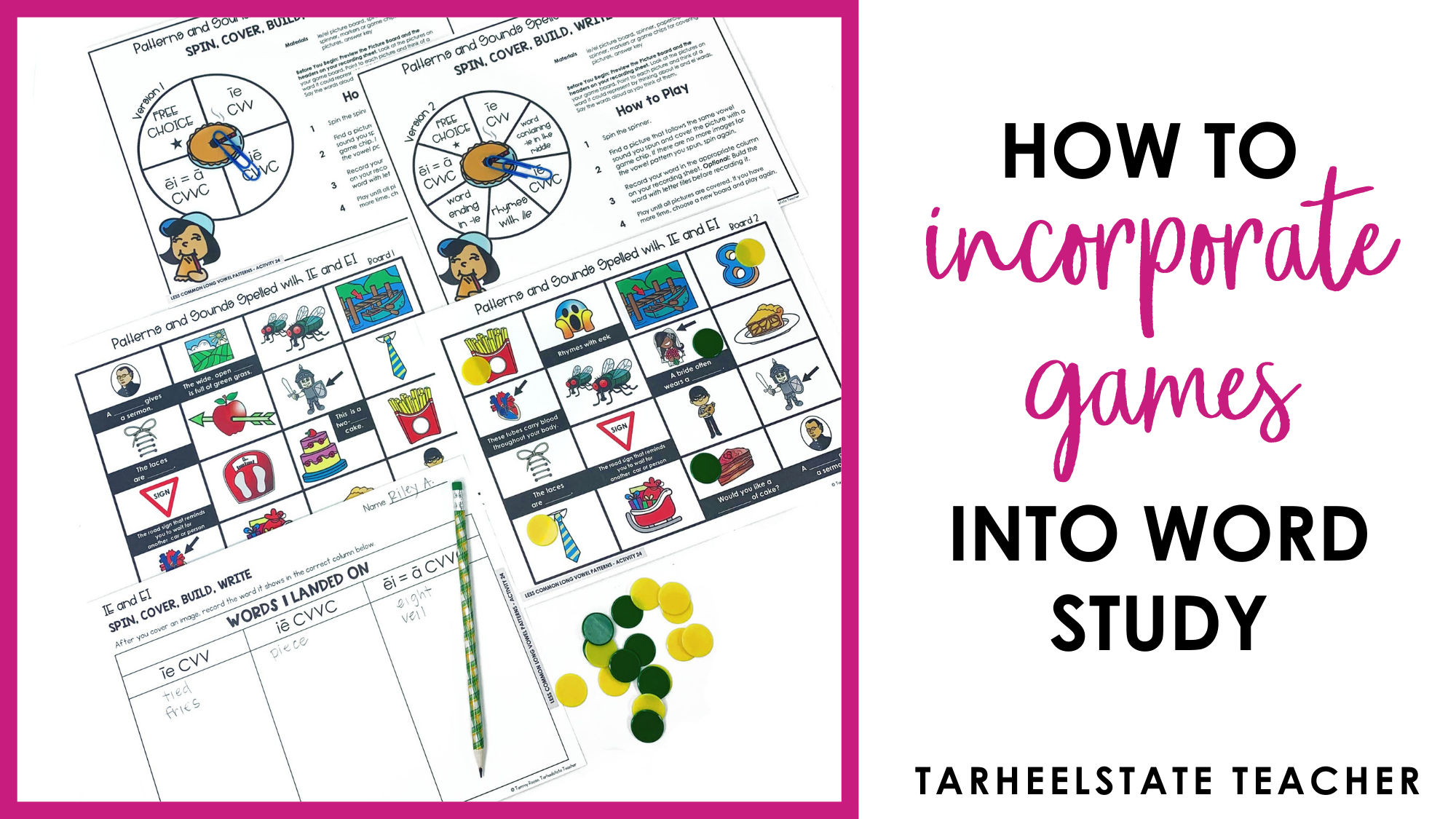6 Ways to Incorporate Games into your Word Study Block
Are you looking for ways to add fun and engagement to your word study routine? Have you wanted to incorporate games and other hands-on activities but not sure where these games and activities might fit into your already busy routine? Well, I’ve had a word study routine that works like a well-oiled machine for many years, but it started to feel like something was missing. This year, I decided that I wanted to increase the level of hands-on fun and engagement by adding in games and interactive activities to help students feel like they are PLAYING with words! If you aren’t sure you want to jump all in with centers or word study games, stick around and read this post! You may find an idea that encourages you to go ahead and dip your toe in the pool!
1) SMALL GROUP MEETINGS
Playing a word study game during students’ small group meetings is an invaluable use of time. Not only does it bring a little fun and camaraderie into your small group, but it also allows you to gather quality informal assessment data on each student as you observe their game play. This can help you make important decisions about who is ready to move on and who needs more time with a given concept.
Want to reduce the stress of having students play new games and activities during their word study rotations? Well, small groups are where it’s at for that, too! Introducing a new game during your small group meeting gives you the opportunity to make sure students understand how to play, review the rules, and set expectations for what they should do in their center while you meet with other students.
2) WHOLE GROUP AS AN INTRODUCTION
We all have those weeks that are interrupted by holidays, teacher workdays, assemblies, snow days, random creatures in the classroom that cause us to evacuate...😜 Sometimes interruptions to our schedule feel like an every-week reality for us!
We can make the most of weeks where our word study routine gets off track by introducing and playing a new word study game or activity together within our whole group plans. (This means you’ll put aside your regular plans and prep enough materials for students to play the same game OR a similar game on their level with partners). Playing games together can bring more excitement to word study and playing them with your whole class allows you to teach rules and expectations so that in the future, games can be played independently, with partners, or in small groups. If you choose an activity format that’s coming up soon for your students, you’ll actually be saving yourself time down the road!
To make the most out of my students’ word study time, I’ve used recurring games and activities throughout my plans so that once students have been exposed to a game or activity, they are likely to remember how to play it in the future with just a quick refresher. We play games like match and memory, a variety of board games, and spinner games where students cover images on a picture board. So many ways to ADD FUN and VARIETY to your word study time!
3) EASILY MAKE USE OF VOLUNTEERS OR SUPPORT PERSONNEL
If you are lucky enough to have willing parent volunteers or interventionists that come in occasionally to work with students, having them play a word study game with a small group or an individual student can help you ensure that time is being used wisely—with very little prep on your part if you’ve already prepared and used the game or activity with students!
To make your life easier, prepare all materials, including directions, for the activities ahead of time. I like to keep everything for one game in a manila envelope or gallon sized baggies and within reach for quick access. This way, I’m always prepared to put a willing pair of hands to work without interrupting my classroom schedule or having to explain directions (and it looks like I’m SOOOO organized, when really, I’m not always on top of things 😂).
4) WEEKLY WORD STUDY GAME DAY!
Who doesn’t love a GAME DAY?! We know students LOVE games. Games have always been a nefarious way for teachers to make our students forget the fact that they are learning, practicing, and applying concepts they have been working on (insert evil laugh here). Prioritizing a bit of fun within our schedules adds variety and increases engagement and intrinsic motivation for our students. Pick a day of the week for GAME DAY (I personally love FRIDAYS for this) and make it happen!
In many of the activities in my word study routine, students focus on practicing with the word study pattern and word list. While this is so important, it’s also a good idea to provide students opportunities to apply their learning to new words that are not necessarily on their word lists. In these “transfer” games and activities, I’ve included words that may not be on students’ word list, but that fit the specific pattern or concept they are studying. I love that these activities allow students more chances to notice patterns and make generalizations about the way words are spelled instead of a focus on memorizing the spelling of their words.
5) ALLOW EARLY FINISHERS TO PLAY WORD STUDY GAMES AND ACTIVITIES
We all have those students who are quick to finish their work (and quick to announce to everyone that they did 😉). If you have a space set up for students to grab resources to work on while others are still working, you can add word study games that can be played independently to their options! Because the games and activities are fun, students are motivated to get focused on them right away. Rather than offering busy work, these activities provide quality, differentiated practice for students.
If you already have a word study area set up in your room, word study games and activities can simply be a choice you let your students know they have when they finish with an assignment early. While you probably have students’ current games organized in bins or file folders, you can also leave a bin of previously played games available for each group so that students can return to an old favorite!
6) ACTIVITIES FOR A “SOFT START” MORNING
While I personally hold morning meetings in the mornings (so my students don’t have a lot of extra time in the mornings), I LOVE the idea of using educational games for a “soft start” kind of morning. If you can provide a soft start for your students, I think it such a valuable way to ease into the school day, let them have a little fun (either independently or with a partner), and get their brains ready for an exciting day of learning...best of all, if you’ve got kind of a boring day ahead (uhmmm, I don’t think learning is ever boring, but ya know what I mean), you’ve allowed them to start off the day with some playtime!
Adding an element of play with games and activities is a way that we can build a strong community of learners that work together toward a common goal---in this case, improving their knowledge of the English language and becoming better spellers. Adding games to your word study routine allows students to work, learn, and play together in a meaningful way. Not to mention, it will be so fun that your students will look forward to the next time you pull out your word study games and activities! I hope you’ve found a new idea for using them today!
And, if you are looking for research-based, easy to use games and activities for your word study block, I’ve got you covered with the resources below! (I’m working on activities for the Within Word Pattern stage, but have Letter Name, Syllables and Affixes, and Derivational Relations Spellers coming along too!)
Want more ideas to add some fun and engagement to your word study block? I’ve got 7 for you here!





